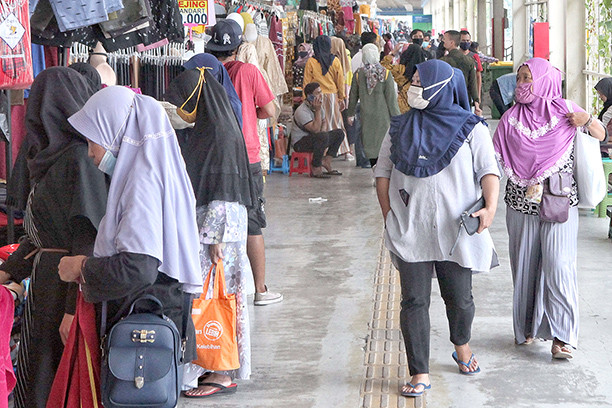Popular Reads
Top Results
Can't find what you're looking for?
View all search resultsPopular Reads
Top Results
Can't find what you're looking for?
View all search resultsTougher social restrictions in Java, Bali put businesses in bind
Indonesian Chamber of Commerce and Industry (Kadin) deputy chairwoman Shinta Kamdani said that while business players understood the necessity of controlling the pandemic, the restriction would be only a short-term measure and would be counterproductive for the economic recovery.
Change text size
Gift Premium Articles
to Anyone
T
he government’s plan to impose stricter social restrictions throughout Bali and Java has put the nation’s suffering businesses in a bind as many recognize the justification for the move but all brace for yet another setback to the economy.
The government announced on Wednesday that it would reimpose large-scale social restrictions (PSBB) on the two islands from Jan. 11 to Jan. 25 to combat a persistent rise in COVID-19 cases. The measure will further limit the public activities of more than 140 million people, requiring 75 percent of employees to work from home and businesses and public places to limit their occupancy and operational hours.
Indonesian Chamber of Commerce and Industry (Kadin) deputy chairwoman Shinta Kamdani said that while business players understood the necessity of controlling the pandemic, the restriction would be only a short-term measure and would be counterproductive for the economic recovery.
“PSBB will definitely hamper the business recovery, especially on the island of Java, as the epicenter of the Indonesian economy,” she told The Jakarta Post on Thursday.
She expected the measure to particularly impact the retail, transportation, food, trade, accommodation and aviation sectors.
Shinta cited Statistics Indonesia (BPS) data showing that last year’s PSBB had impacted 29.12 million workers, more than 80 percent of whom had had their work hours or wages cut.
Read also: Unemployment surges to decade high as COVID-19 causes millions to lose jobs
The announcement of tighter restrictions came as the country saw a new daily case record of 9,321 on Thursday, bringing the cumulative national tally to more than 797,000 cases. The government is seeking to cut active cases in half with the stricter social restrictions to relieve the dangerously strained hospitals on both islands.
Meanwhile, businesses are expecting an economic recovery this year as the government prepares for an ambitious program to inoculate 181.5 million Indonesians within 15 months. It expects vaccinations to start this month.
Indonesia plunged into its first recession in two decades in the third quarter of 2020 as the government struggled to contain the coronavirus outbreak and the attendant economic fallout.
The government and the central bank have predicted that Southeast Asia’s largest economy will grow between 4.4 and 6.1 percent this year, largely driven by an expected recovery in consumer spending after vaccines become widely available.
Coordinating Economic Minister Airlangga Hartarto said not all cities and regencies in Java and Bali would implement the stricter restrictions but noted that Jakarta would.
“This is not for all regions in Java and Bali. But the handling takes place at micro level, namely cities and regencies in line with the criteria of the death rate, recovery rate, active cases and bed occupancy rate,” Airlangga said during a virtual briefing on Thursday.
The food, energy, information and communication technology, financial, logistics, hotel, basic services and utilities sectors will still be allowed to operate under the restrictions as the government considers them essential.
Lin Neumann, managing director of the American Chamber of Commerce (AmCham) Indonesia, said the business group supported the government’s measures as the country needed to curb the spread of COVID-19.
“It is clear that the crisis is continuing, and I think this is the right move for now,” Neumann told the Post in an email on Thursday.
“The biggest threat to economic recovery and renewed investment is COVID-19. The restrictions and hopefully a strong vaccination program will help increase investor confidence. I know there is economic pain, but strong action is needed in AmCham’s view.”
Read also: Transitional PSBB extended as cases spike
Piter Abdullah, an economist at the Center for Reform on Economics (CORE) Indonesia, concurred.
“Although it will negatively affect the economy in the short term, we need this tightening,” Piter told the Post by text message on Thursday.
“It aims to avert a surge in COVID-19 cases that, if it occurs, will force the government to impose full PSBB or a lockdown that will have a greater impact on the economy and the national recovery.”
The World Bank has highlighted the importance of public health measures to fight the COVID-19 pandemic, as well as government support for households and businesses.
“Strong and well-implemented public health and economic policies are the keys to accelerating and strengthening the recovery,” World Bank country director Satu Kahkonen said during a virtual press conference on Dec. 17.
The World Bank expects Indonesia’s gross domestic product (GDP) to have shrunk by 2.2 percent in 2020 and to rebound to 4.4 percent in 2021.
“This is subject to the assumption that the pandemic is contained, structural reforms are implemented and help mitigate the effects of the crisis,” World Bank acting lead economist Ralph van Doorn said at the time.










